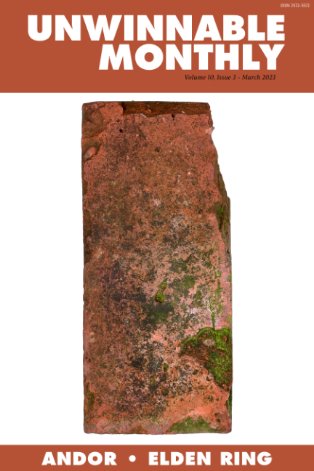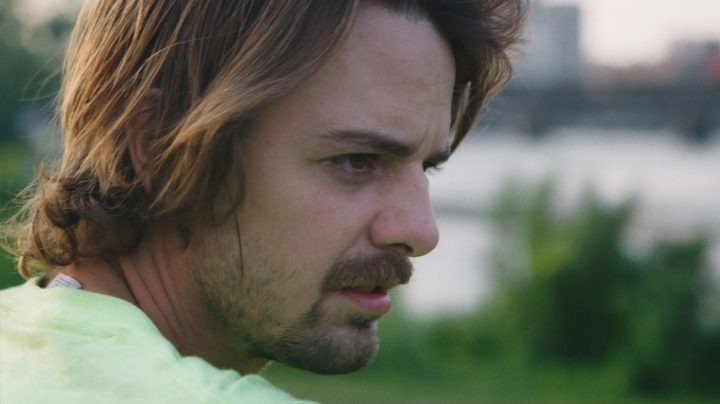
Behind the Camera

This column is a reprint from Unwinnable Monthly #161. If you like what you see, grab the magazine for less than ten dollars, or subscribe and get all future magazines for half price.
———
Reframing the boundaries of what is seen and unseen…
———
Bing Liu’s documentary, Minding the Gap, starts with a group of boys descending a downtown parking garage on their skateboards out into the empty streets of Rockford, Illinois during golden hour.
The opening of the film highlights a major strength of Liu’s feature length debut: his willingness to insert himself within the documentary, first pushing his friends to look inward and make sense of the personal traumas they all share. Second, by turning the camera on himself and examining his own hardships. What we get is a documentary that explores the very personal narratives around domestic abuse this gang of friends has instead of a sweeping look at the topic from a wide-angle lens.
Liu’s documentary follows the lives of two of his friends, Keire and Zach, who he’d met at the skatepark. They both are young men navigating the tensions that we all face in early adulthood around wanting to have fun while pursuing a goal that can allow some form of security.
While the boys share a love for skateboarding, the heart of the documentary lies in the shared histories and traumas surrounding domestic abuse. Through learning about these personal histories, Liu highlights how these experiences affect young men’s own identities and also their relationships – romantic and platonic.
Keire and Zach handle their feelings regarding their abuse much differently from one another. Keire, a soft-spoken Black man, talks to the camera as if his heart is splayed open for the world to see. He talks to Liu about the abuse he faced from his father openly and honestly. Keire talks at length about the anger he felt toward his father growing up, but also how his passing revealed a love and admiration he’d not realized existed before.

Zach is a more brash foil to Keire. He is closed off about the abuse he received from his father growing up. At one point, he admits that by today’s standards we might call it “child abuse,” but also that sometimes people “need” to be physically disciplined. These words hold a more ominous weight coming from him given the fact that Zach and his girlfriend, Nina, have a child together early on in the film. In both cases, Liu isn’t interested in casting judgment on his interviewees’ beliefs, but he is also not afraid of pushing them to dig deeper, much like a good friend would.
This is how Liu depicts his own hometown in the film. His directorial style for this project doesn’t seem interested in casting an objective portrait of his rustbelt stomping grounds, but instead, it showcases landmarks that caught his eye or meant something to him and his friends.
While some documentaries gain credibility through highlighting a menagerie of voices in order to comment on an idea, Minding the Gap is deliberately sparse, with the film being composed almost entirely of interviews between Keire, Zach, Nina and their families. Much like the anti-establishment sentiments of the community these men reside in, halfway through the film Liu does something that many would say is a faux pas in documentary filmmaking – he injects his own personal story into the narrative.
Liu himself was a victim of domestic abuse at the hands of his step-father growing up. In emotional interviews with his step-brother and mother, Liu steps out from behind the camera and reveals himself to the viewer, inviting them to sit with him as he talks with his family about the beatings inflicted on him growing up. His mother, a Chinese immigrant who worked countless hours to keep her family afloat, has trouble talking about these events (which often happened while she was away working).
Through tears, she tells her son how she wishes she could go back in time, but also how she realizes that isn’t possible, how she knows there is no going back after experiences like this. One (of the many) things that Liu succeeds at with his documentary is highlighting the tightrope act we face when confronted with abuse, how sometimes we are equally complicit while also victims, and how our own pasts can make us fall prey to being complicit in the abuse of others.
While interviewing Zach after an intense fight he had with his girlfriend Nina, his friend plays an audio recording of Nina yelling a variety of threats at Zach – “I’ll kill you!” She yells at one point. The audio is intense, and much like someone you know might react, Liu is surprised to hear this, but like a good documentarian would do, he uses this opportunity to dig deeper and explore what was really happening in Zach and Nina’s relationship.

Later, when Liu is interviewing Nina, he asks about the recording and she tells him that, while that might make her seem crazy, Zach didn’t tell him how moments before he started recording he had hit her during their argument. Off screen, we hear Liu say, “I didn’t know that,” and Nina reply, “Yeah, and that isn’t the first time that it happened either . . . We just kind of ignore it like it didn’t happen.”
Stories about the cyclical nature of abuse are by no means new, but Minding the Gap approaches it with an honesty and vulnerability that is admirable, to say the least. In our current cultural moment, we are making some forward progress in terms of confronting sexism, misogyny, consent and sexual assault. A problem that still persists, however, is that women have (and continue to) be the ones doing much of the labor and self-policing to stop abusers and educate communities.
The trajectory of the documentary post Liu finding out about the domestic abuse issue in Zach and Nina’s relationship highlights the true-to-life questions one might have when finding out such incriminating information about someone they look at as a friend.

The documentary never overtly paints Zach’s action as wrong, there is no ‘bad guy’ in the narrative of the film and while one might argue that this could be problematic, I found this angle to be a surprising and honest way of approaching the situation. Reading interviews with Liu, it is obvious that he believes Zach’s actions are wrong, but it seems like what he is more interested in facilitating with this film is the importance of dialogue, especially between men, to confront issues of violence, misogyny and trauma head on, even if things are uncomfortable.
By no means is Minding the Gap a blueprint for how men should grapple with trauma or hold each other accountable for each other’s actions. But what Minding the Gap does represent is art that wades into the murkiness of life. As a writer with an extensive past in creative nonfiction that often weaves the lives of others into my own, Liu’s self-insertion felt like a stark reminder to process my own gaze within my art. A nudge to remember that creative nonfiction is at its strongest when the author is willing to place the same level of scrutiny on their self as they do their subjects.
———
Phillip Russell is a Black writer and podcast producer. His writing explores the intersections between pop culture, Blackness, and our connection to land and identity. Follow his work on Twitter @3dsisqo.




